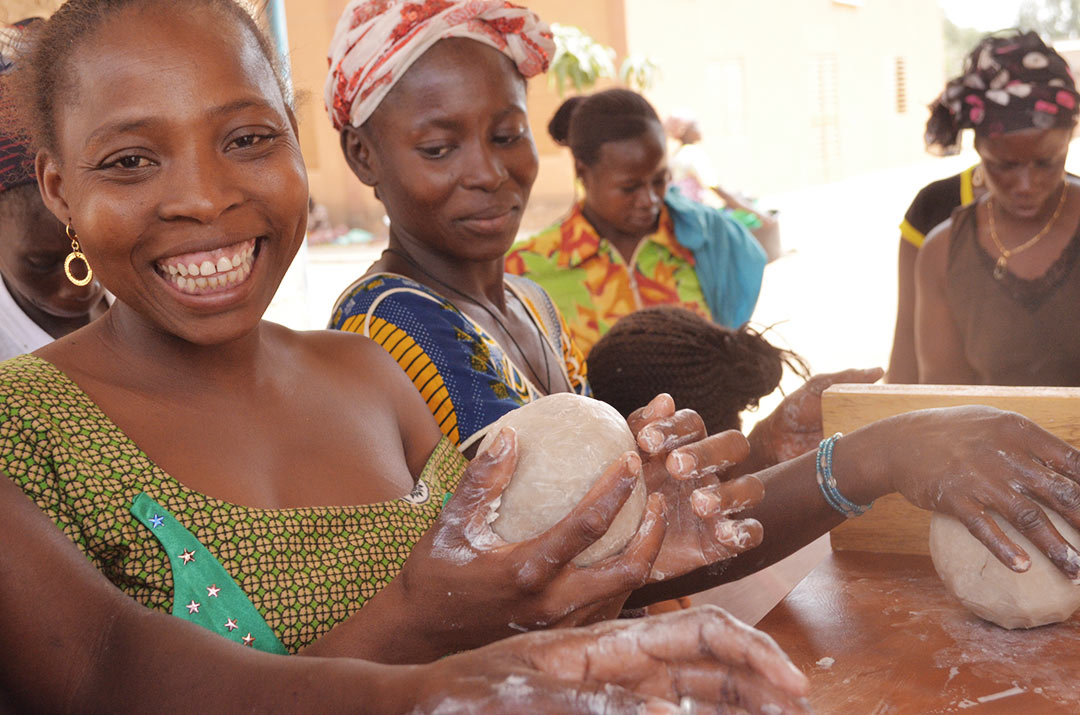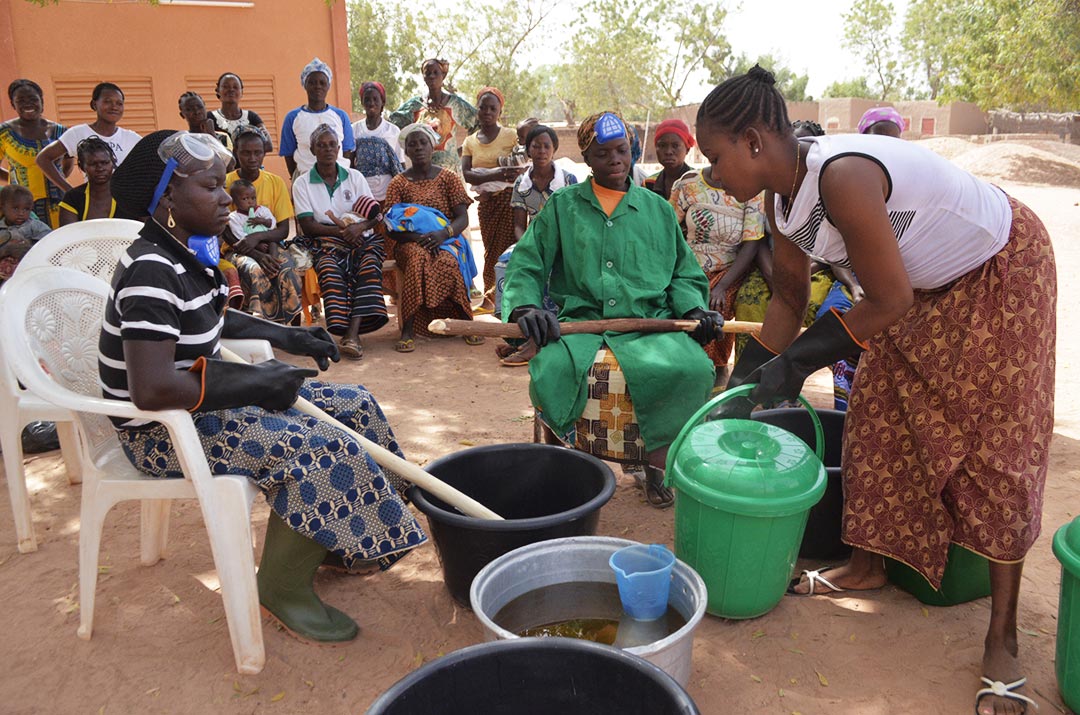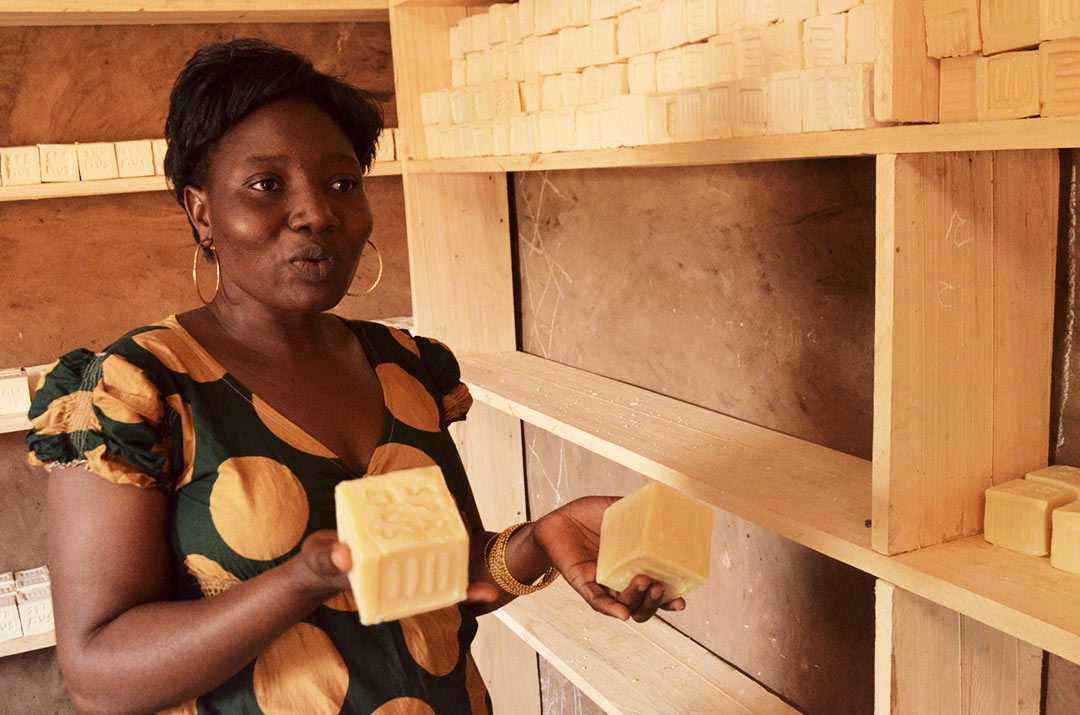An intervention in Burkina Faso is giving moms the tools they need to support their families.

It’s still morning, but the blazing west African sun is already baking the church’s adobe walls and causing heat waves to shimmer like water above the dusty ground. In the shade of an old tree beside the church, Julienne sits with several other mothers in Burkina Faso’s Child Survival Program. They measure ingredients into several large tubs, then gently stir the bubbly liquid until it’s a smooth, cream-coloured paste. The sweet smell of shea butter and coconut oil wafts from the tub, and Julienne smiles. It’s the smell of hard work, stability and a better life.
Julienne and her family live about 20 kilometres from the country’s bustling capital. Julienne’s husband, Alain, works as a bicycle mechanic. His occupation is in demand, as bicycles are a primary form of transportation in Burkina Faso. But on average, Alain brings home less than $1.30 a day—barely enough to pay for the family’s one daily meal, much less cover additional expenses.
“My children couldn’t have breakfast because I cooked one meal per day,” says Julienne. “When a child fell sick, my husband and I either borrowed money from relatives to send that child to the local medical centre, or we just relied on traditional medication.”
For Julienne, this was simply the way things were. Many women in Burkina Faso lack the education and skills to help support their families. According to UNICEF, two out of three women over the age of 15 are illiterate. Only 50 per cent of girls attend primary school, and less than one in five make it to high school. Many marry young and begin having children in their late teens. There are few opportunities to complete their education, learn skills or help provide for their families.

But things are changing where they live. When the local church first opened the Child Survival Program in 2012, Julienne, then expecting her son, was among 45 new and pregnant mothers to be registered. Julienne received medical care and nutritional support. She learned how to care for herself and how to love and support her children’s development. Best of all, she learned about God’s love and the hope He offers through His Son.
The program is also helping the mothers learn skills to help provide for their families. In 2015, through the help of a Complementary Intervention, the mothers learned how to make soap and began a business selling the soap together.
First, they extract the butter from the pit of a shea fruit, a small, green fruit found in abundance in Burkina Faso. Second, they combine the shea butter with coconut oil, water and lye, and then pour the mixture into a large mould. Once dried, they cut the soap into patterned cubes. Last, the mothers print their brand, Super Moss, on each bar of soap, so it can be easily identified in the marketplace. The mothers currently produce hundreds of bars of soap every week.
The women are divided into three teams and rotate duties, relying on and providing support to one another. Learning to run a small business together has provided them the unique opportunity to be entrepreneurs without the pressure of managing a business alone. They recently opened a soap shop at the Child Survival Program.

Elise, the Child Survival Program Implementer, is proud of the mothers’ determination and success. “These women are really motivated and are gradually mastering the production of soap,” she says.
The business has brought hope for the future to these mothers and their families.
“Now my life is no longer the same,” says Julienne. “I earned $2.60 after selling soap and the day after, I realized that Alain couldn’t provide for our daily meal. So I used my profit to buy vegetables and cook rice and fish for the family, plus some cookies and sweets for my new son and his two siblings.”
These women, who once felt helpless to change their situation, are discovering their ingenuity and business acumen. They are finding new ways to diversify their business by making different sizes of bars, having various price points for their products, and expanding into new markets. The women have learned that they have the skills and resources to change their circumstances.
“Thanks to Super Moss,” smiles Julienne, “I can now feel the joy of motherhood and be useful in my community.”
by Jehojakim Sangare, Compassion Burkina Faso, and Aveleen Schinkel, Compassion Canada




